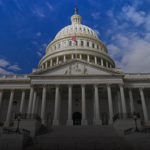Preview this deck
Full Faith and Credit
Front
Active users
5
All-time users
5
Favorites
0
Last updated
10 months ago
Date created
Jun 15, 2020
Cards (74)
Unsectioned
(74 cards)
Full Faith and Credit
States must give F.F.C. to legal documents of other states
Federalists papers
Series of essays written by Hamilton, Madison, and Jay published in 1787–1788 to convince people to amend the constitution
Extradition
The requirement for a state to return a fugitive to a state from where he or she fled.
Dual Federalism
The national and state governments have defined areas of authority
Political Culture
A patterned set of ways of thinking about how politics and governing ought to be carried out
Government
individuals in charge of running a state or region
Mandate
Requirements that direct states or local gov. to comply with federal rules under threat of penalty or as a condition of receipt of federal grants.
Republic
Power is vested in people and representatives, which are selected by popular vote
Constitution
Basic written set of principles and models of federal government in the US. Approved Sep. 17, 1787
Concurrent Powers
Powers shared by both the national government and the states.
Internal Efficiency
Confidence in own abilities to understand and influence politics
Decentralization
Loosening power of the national government to represent government
Separation of Powers
The legislative, executive, and judicial powers of government are in separate bodies.
Political Ideology
Set of views as to the as to the policies government should pursue
Power
The ability of one person to get another person to act on their intentions
Intergovernmental Relations
A department in a city that is accountable for coordinating and monitoring activities with the state, federal and other local governments, and public agencies.
Legitimacy
Political authority conferred by law, authority, public opinion, or constitution.
Great compromise
Providing the states with equal representation in the Senate and proportional representation in the House of Representatives.
Representation
Speaking or acting on behalf of someone or the state of being represented
Democracy
System in which people are said to rule, directly or indirectly
Authority
The right to use power
Judicial Review
The power of the courts to declare acts of the legislature and executive to be unconstitutional
Formula Grant
Grant awarded based on statistical criteria for specific types of work
New Jersey plan
Proposed to amend the Articles, enhanced national gov. power, each state still had 1 vote
Categorical Grants
Federal grants for specific purposes defined by federal law.
Confederate System
States or regional government retain ultimate authority
Articles of Confederation
First constitution of the U.S. (Drafted in 1777 and ratified in 1781)
Minority rights
Rights applied to various minority groups
Grants–in–aid
Amount of money given to local government, institution, or scholar
Federalism
Ultimate authority is shared between a central government and state or regional governments
Privileges and immunities
Prevents a state from treating citizens of another state in discrimination manner. (Act IV, sec. Clause 1)
Connecticut Compromise
Providing the states with equal representation in the Senate and proportional representation in the House of Representatives.
Shay's Rebellion
1787 rebellion to fight foreclosures of forms as a result of high–interest rates and taxes.
Public Policy
Principle on which social laws are based
Hyperpluralism
A state in which many groups or factions are so strong that a government is unable to function
Declaration of Independence
Document written by Jefferson claiming independence from Britain
Block Grants
Grants of money from the federal government to states for broad programs
External efficiency
Belief that the system will respond to citizens (has changed a lot)
Factions
Groups of people who influence public policy in ways for the public good
Policy Agenda
A set of issues and policies laid out by ideological or political groups
Policy Gridlock
Situation in which there's difficulty passing laws (Gridlocked when the ratio between bills passed and the agenda of the legislature decreases)
Political Efficiency
Ability to effect government
Limited Government
Government that is limited by law
Bicameral
legislative body having two branches or chambers
Enumerated powers
Powers directly stated in the constitution
Devine Right Theory
Asserts that monarch derives his right to rule directly from god
Pluralist theory
Competition among all affected interests shapes public policy.
Supremacy Clause
Makes the constitution the supreme law of the land
Federalists
Supporters of the constitution. Supported a stronger central government
Checks and Balances
The power of the legislature, Executive, and Judicial to block some acts by the other two branches
Social Contract Theory
Societies exist through a mutual contract between individuals, and the state exists to serve the will of the people.
Fiscal Federalism
Using money to influence states
Implied Powers
Powers that are necessary for carrying out enumerated powers. (Necessary and proper)
Consent of the governed
Citizens agreed to be governed
Revenue sharing
A portion of federal tax revenues is shared with state and local governments.
Amendment process
Officially proposed by a two–thirds vote in both houses of Congress (or by two–thirds of all state legislatures), then it needs to be ratified by three–fourths of the state legislatures (Article 5, Section 1)
Project Grants
Awarded based on the merits of an application
Majority Rule
Greater number should exercise greater power
Politics
Process in which gov. leaders are selected and what policies they pursue
Bill of Rights
A list of rights and liberties for the American people. ( Freedom of speech, religion)
Necessary and proper clause
Congress can pass all laws that are N&P to carry out enumerated powers
Devolution
Effort to scale back responsibility (power) of the government and to shift it to the states
Constitutional convention
Meeting in 1787 to revise the Articles, but instead created a whole new government
Anti–Federalists
Delegates against the constitution. Didn't want supreme power in the government.
Sovereignty
Supreme political authority **A sovereign government is one that is legally and politically independent of any other gov.**
Policymaking institutions
Congress, the presidency, and the courts established by the Constitution to make policy.
Cooperative Federalism
Asserts the National Government is supreme over the states
Natural Rights
Unalienable rights (laws that can't be taken away: Liberty and speech)
Linkage institutions
A structure that connects the people to the government
Elastic Clause
Necessary and proper
Elite and class theory
Identifiable group of people who possess a disproportionate share of some political power.
Modern Society in two major classes, capitalists and workers
Civic Duty
Belief that one has the obligation to participate in civic and political affairs
Reserved powers
Powers granted to the state and people (10th amendment)
Delegated power
Powers that are granted to the national government




